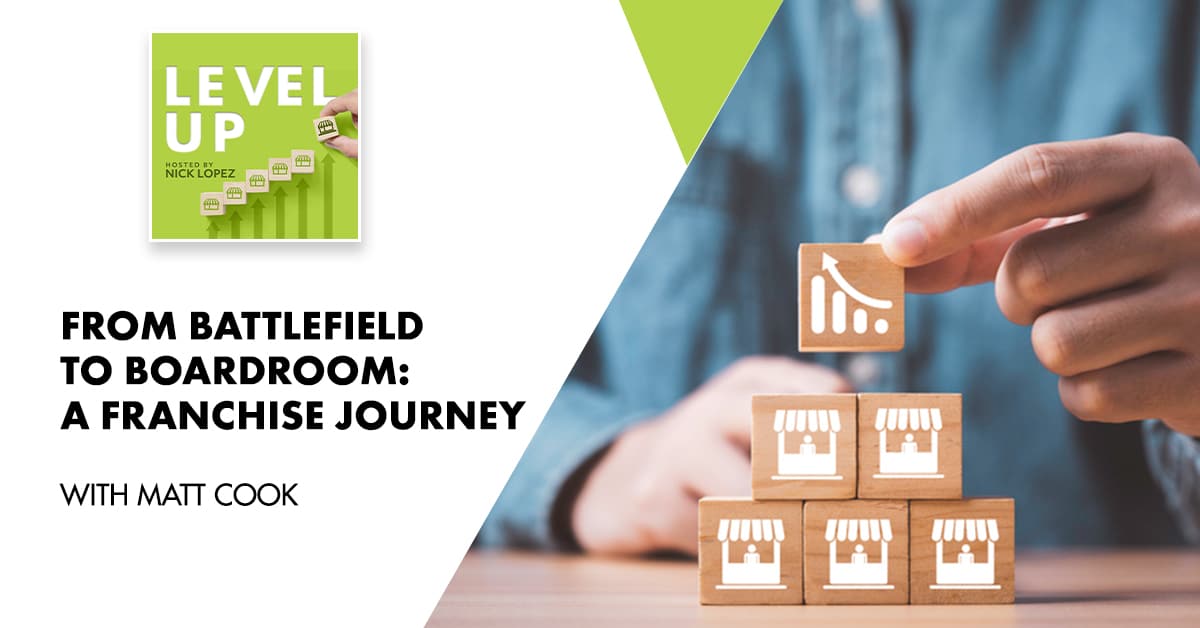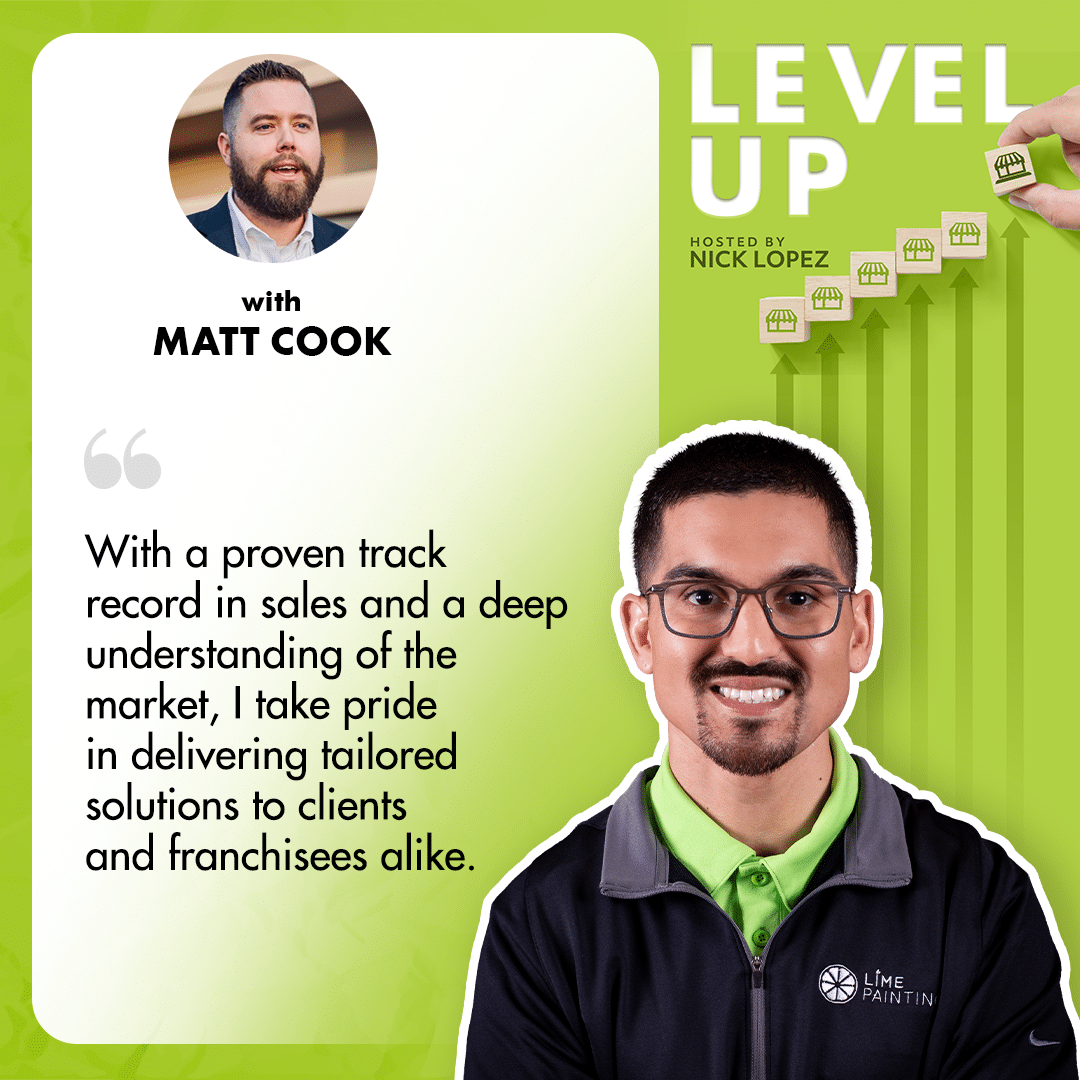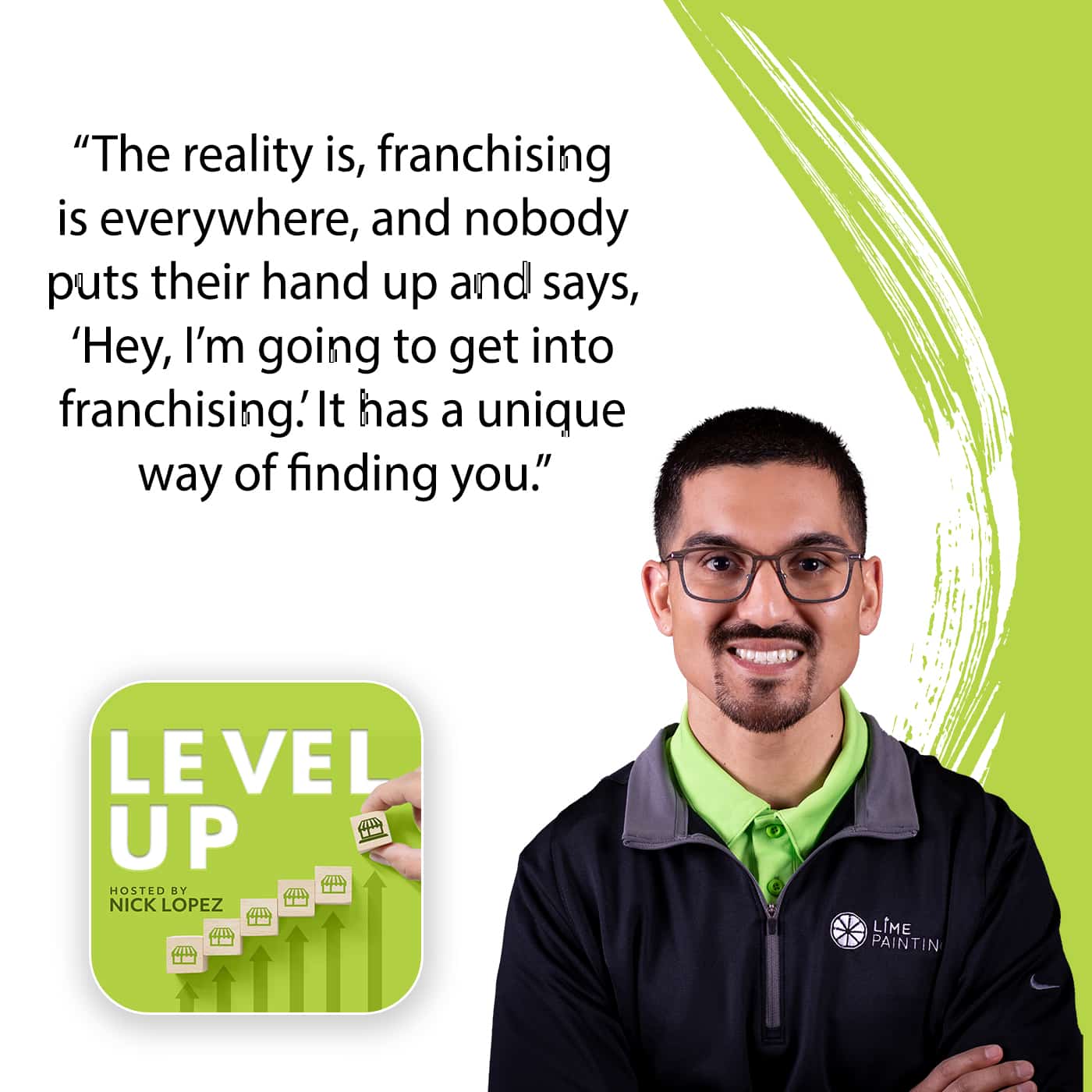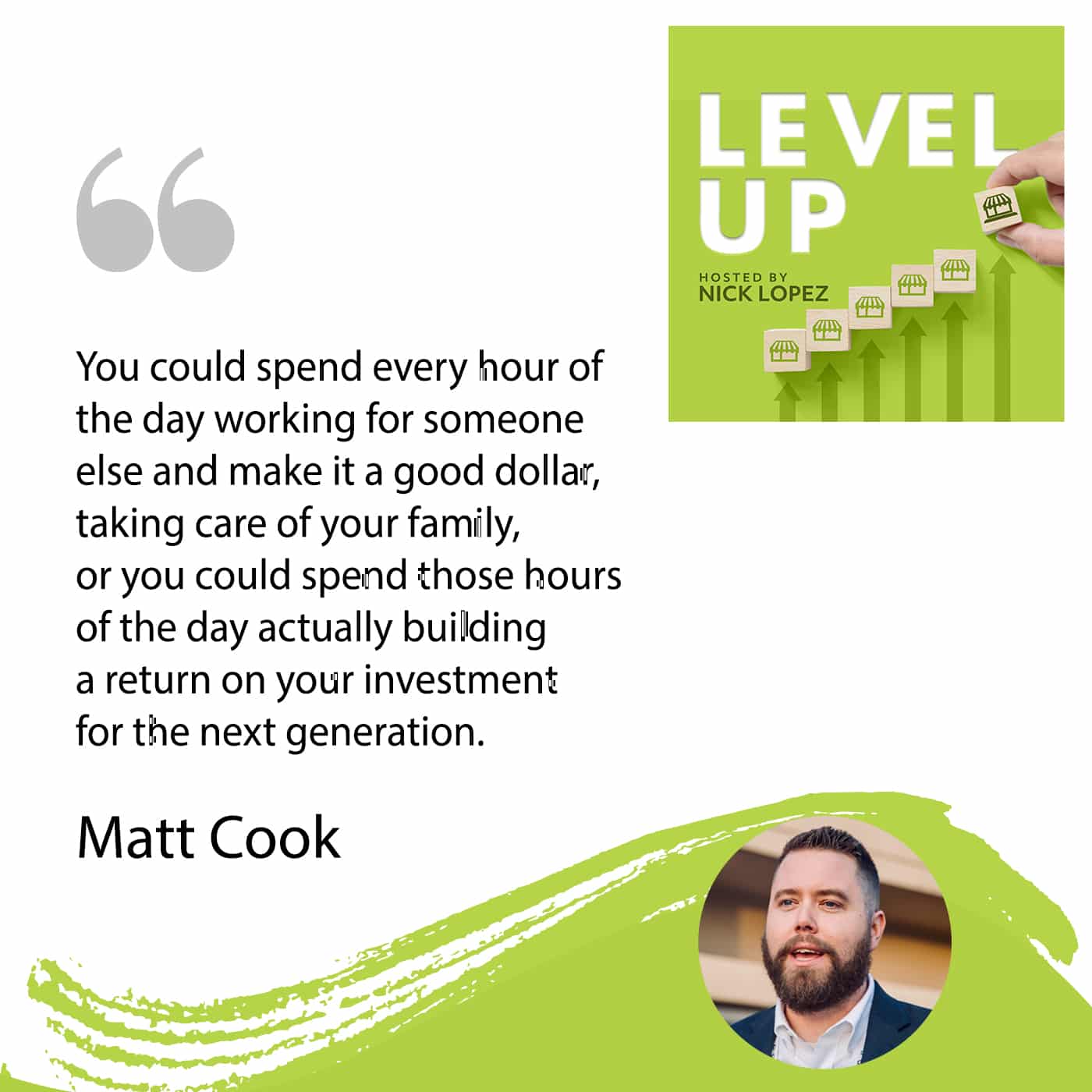
In this episode of The Level Up Show, host Nick Lopez sits down with Matt Cook, the Director of Franchise Development at HomeTeam Inspection Service, to uncover a compelling story of transformation. From his beginnings in the military to navigating the challenges of civilian life, Matt’s journey took an unexpected turn through marriage and a chance encounter with franchising. He shares how the discipline of the Marine Corps and the world of sales shaped his path and led him to build a business empire. Together, they explore the essence of franchise ownership, the power of a collaborative community, and the unique approach of HomeTeam Inspection Service in empowering franchise owners to achieve the American Dream. Tune in to hear Matt’s insights on leadership, legacy, and the untold sides of franchising.
—
Listen to the podcast here
From Battlefield To Boardroom: A Franchise Journey
We have the Director of Franchise Development with HomeTeam Inspection, Matt Cook. Welcome to the show.
Thanks for having me.
Folks have many different impressions of what franchising is. Oftentimes, it’s fast food. I don’t understand that there are a lot of different services. I often joke, as long it’s ethical, moral, and makes money, it can be franchised. That includes even services that aren’t all that sexy up front. The reality is franchise is everywhere and nobody puts their hand up and says, “I’m going to get into franchising.” It has a unique way of finding you. Matt, I’m curious. How did franchising find you?
Matt’s Journey To Franchising And Its Benefits
Through marriage. If that’s a good answer. I was in the military for a couple of years and when I got out, I struggled to find my place which I think is a lot of people. Maybe your readers are trying to figure out if franchising is right for them or something of that effect. I wasn’t sure where I fit into the civilian world outside the military and didn’t have the education or training to pursue the goals and things that I wanted to.
I found myself in sales because the harder you work, the more money you make. I did well in it, but then through marriage. I met my wife when I was in the military, but her dad started HomeTeam Inspection Service. Many years after we had been married and had kids, my father-in-law approached me and talked about the same things that I talked about with our franchise owners. You could spend every hour of the day working for someone else, making it a good dollar and taking care of your family, or you could spend those hours of the day building a return on your investment for the next generation.

Basically, he told me, “I may or may not pay you what you’re getting paid. You may be able to do better elsewhere. At the end of the day, would you be interested in building our kids’ and grandkids’ future every single day?” That’s why I’m here at HomeTeam. That’s why I found my way here. I started in franchise sales because sales were my forte, and I wanted to bring on the right people and the right franchise owners. Now, I’ve worked myself up to an operations director role where I manage a lot of day-to-day operations at the home office.
That is certainly important work. Home office is the core. What you talked about is achieving the American dream through franchise ownership. Your father-in-law sounds like a great man, and what an awesome way for you to build an empire and a legacy with other business owners. Was that different for you? I know that you love sales. The more you work, the more you earn, but when it comes to franchising, sales, like any organization, is very much a big part of any franchise company. What I’m saying is, was that different for you learning? You talked about being at home office. Was the franchise relations aspect of franchising new or different for you? Can you speak to that a little bit?
It’s different than being a regional sales manager in a large company. From that perspective, I worked a lot on my own. I had my own goals, cash, and discipline that resulted in my own reward. A little bit different when you’ve got a lot of people who look to you for guidance and leadership. A little different when you’ve got employees at the home office, but obviously our franchise owners, but even their families.
They’re expecting that home office to have that next new thing that’s going to help them grow their business to benefit those families even further under that umbrella. It is quite a bit different, but I would also like to go back to my prior military experience. I was in the Marine Corps. I was an elite instructor at Schoolhouse, teaching people to go be leaders, team leaders, squad leaders, and platoon leaders for deployments.
Those sorts of experiences benefited me quite a bit, coming into HomeTeam, working with the staff and the relationships, and realizing that it’s not as simple as a boss-employee relationship. We’re all working together for the same goal. How do we build up the team? How do we encourage each other together? It was a little bit different than sales but not immensely different from my experience in the military.
Collaboration And Community Within The Franchise
At the core of that is community. Also, a collaborative community. Can you speak to what that collaboration looks like within your organization?

From a community standpoint, we are a little bit different from other franchise owners. What I mean by that is we’re not equity-owned and capital-owned. We’re a privately held organization. Our family has the same goals, desires, and legacy as any of our franchise owners do. They feel even camaraderie with the family that owns the entirety of the business because we don’t grow unless they grow. Even internally, we make sure through a franchise advisory council and through different regions.
Even then, through a forum online. Many different ways to connect our franchise owners with mentors, local mentors and their statements regionally. That builds that community. They get together on that forum. They talk back and forth throughout the year with the same people they originally opened up with. Maybe in a different state, but they were in the same class. That community starts there in day one when you start your franchise and you’re getting into this entrepreneurship thing with other people and peers in different areas and walks of life.
It continues even through our business coaching and our national summit at the beginning of every year. There are many different ways we try to bring people together. When you’ve got that common goal and that community, everybody wants to build business together. Everybody wants to help out their neighbor versus keeping it all to themselves.
That is the superpower of a franchise organization and everybody is rowing in the same direction. Would you mind sharing with us a little bit about what makes your organization so special?
Franchise Model: Team Approach Vs. Owner-Operator
First of all, it’s the people. What we do inherently in the field is different. Our model and the way we operate businesses are different. At the end of the day is a great book called Who Not How. I feel like I’ve been talking about it a lot. It’s been on my mind even in staff meetings, but it’s much more important to bring on the right people who are good for your culture and your community like we’re just talking about rather than worrying about their experience level and background, whether or not they have the resume for the opportunity or for the franchise system.

For us, specifically, it’s the people that make us special. We’re out there doing home inspections. This is the biggest purchase of somebody’s life. You talk about the American dream. I firmly believe the American dream is not dead, even though people try to say it over and over again. At the end of the day, that homeownership, independence, and family core are extremely important. When you’re thinking about the property that someone’s buying potentially the first time they buy a home, a lot of people don’t know what they’re buying.
They’re buying blind and it’s the biggest purchase of their life. It is an emotional purchase. You begin to picture your kids and your future family in this home. Having our team be able to come in there and quell fears. Ease the minds of the people buying the homes and even the real estate agents involved in the deal. That’s a very difficult thing to do. It takes expertise and people skills. Our people, in general, around the country are what makes us special.
From a HomeTeam perspective and a model perspective, our organization is quite unique compared to other home inspection companies. About to 90% to 93% of our industry is owner-operator and 7% is franchisees. Everyone else outside of HomeTeam franchise-wise sells a model that’s geared towards an individual being an inspector.
My opinion is that if you’re buying that franchise system, you’re buying a job. If you’re not building something bigger than yourself, you’re buying a job. With us, our goal is not for you to be the inspector. It’s to build teams. You’ve got to start somewhere, learn the business, and start that first team being on the team. The goal is to get Nick off the inspection so that you can then build value and relationships with real estate agents and that referral network. You become more of a leader in your community and in your business than you are an operator in your business.
Down the road, whether you’re giving that organization to your children or you’re selling that business. It’s a very tangible and sellable asset that someone could purchase. That model of a team approach is unique in itself in the field and unique from our industry. It allows us to be faster, more accurate and more efficient. At the end of the day, those teams as you’re building that business, allow you to have a business versus a job. To me, that’s the most important thing.
That empire builder and an operator. There’s obviously a model for every type of entrepreneur. That’s one of the many different aspects of franchising. That is so awesome, as you have a blueprint on how to scale value in your community and to do it in different types of models. All the support to do that across the business so that you can work on it is built into the foundation of home office. Matt said it. They don’t grow if their franchise partners don’t grow. That is what makes franchising so powerful. It is mutually beneficial.
That is awesome. I love that. I want to transition and get your thoughts. We talked about creating an experience for a new franchise owner and doing that in community. You’re now adding in this piece of how they go about doing it, the blueprint, if you will. You take all of that. It is an experience. You can call it the American dream. You said some say it’s dead.
Disagree.
It depends on the experience, the situation in the community, and the support. There are many different elements of a flourishing franchise organization. I love that you folks are family-owned and truly invested in the franchise owners or the stakeholders. Those stakeholders didn’t get trumped in your organization. I should say that as an if then but clearly, within your organization, that is how things are. Speaking of owner-operator, empire builder and all these different models. How many average territories do the owners within your company own?
Most of our owners only own one territory. Now, there are some that own two. The way we do territories, though, is different than the rest of our industry. Ours are generally about three times larger than any of our competition in the home inspection space by default. If you’re an owner-operator or an independent inspector, you’re doing enough jobs for yourself on an annual basis. There’s no reason for you to have an entire city. One of our competitors, I could sell 5 to 10 franchisees in Cincinnati, where I live.
For us, we have one owner in Cincinnati. That one territory, the way we build it, allows that individual not to have to reinvest in real estate, essentially in order to succeed. We give them everything they needed in the beginning to grow beyond that. One territory is the average, but most of the ones that have two territories are generally in a situation where maybe they bought half the city originally and then built a business.
Why not just buy the other half of the city? I’d rather protect my investment. I’d rather have this entirety to myself. They end up going on and becoming some of our larger franchise owners. It is not a requirement for success to buy more than one territory, but a lot of the ones that are on a larger scale do because then they own the entire city.
Initial Investment And Franchise Fees
I assume that folks are adding on additional territories when they have more that empire mindset. It is great that you guys give large territories. They can focus on their investment being in their operation and having a large territory to do just that. What does the initial investment cost to become an owner? What is the franchise fee? What is the initial investment? What does that look like?
Multiple tiers. Multiple different-sized territories. We have what’s called a limited territory, a standard and a premium. Most people buy premium by default because they never want to view themselves as standard or limited. That being said, most people are in that standard or premium territory range. A standard territory is a $55,000 franchise fee and a $9,800 startup package. The premium territory is $65,000 franchise fee and the same $9,800 startup package.
Essentially, it’s a $10,000 difference for 50% more homes with the premium territory. Realistically, we give you everything you’re going to need to own operate and run that first team with that initial investment. You’re not going to have to go out. You’re not going to have to pay for more training. You’re not going to buy more tools. Most people utilize their own vehicles in the beginning. We pay to get that vehicle wrapped in the beginning. We buy them apparel and business cards.
All the things that you could need in order to get set up and operate with that first territory. The hope being, on our end, at least, you’re not having to reinvest a lot of capital in your business outside of marketing and things locally for the first couple of years. We want to give you everything we can upfront and we’ll call it a $55,000 to $75,000 startup range.
$55,000 to $75,000 in total initial investment that’s for premium territories.
That’s a little cheaper than some other opportunities.
That is fantastic. Thanks for sharing the initial investment. What else would you like to mention? Do you just want to feature different elements of what makes your organization so special?
Team Approach To Home Inspections
One of the things we mentioned already is our model, that team approach. Our owner was an average everyday tradesman starting the business. He was a $ 4-an-hour construction worker with no college degree. He realized, “If I’m just the same as everyone else. There’s no incentive for a client to use me or a real estate agent to refer me over anybody else.” Coming in and saying, “I do a better job or I have better tools or I’m going to be more.” It doesn’t matter to the real estate agent and the buyer. You’re going to end up competing on price.
He ended up asking the real estate agents that he was working with what he could do differently and what he could do better. All that feedback led to the fact that there are two main pain points in the home inspection industry. The first one is it takes home inspectors far too long to get on site. The average home inspector is usually booked about a week out. When you think about it from a sales perspective, time kills deals.
The last thing a buyer needs to be doing is sitting on our hands for a week after they just made the biggest purchase of their life. They’re going to be sitting there worrying about it. Watching Fixer-Upper on TV and getting scared to death by all the craziest situations you could ever find. That’s not good for the real estate agent either who wants to close a deal. Getting there faster was something that was paramount to them.
The second thing was the average inspection, even now for an owner-operator takes 3 to 4 hours to complete. For HomeTeam, it’s on average. It’s less than minutes and that’s because one person can do it in 3 or 4 hours. Two people can do it at half the time. Hence, the team approach. We bring two people that allow us to do faster inspections, more efficient inspections, and more accurate inspections. We can do 3 or 4 inspections per day per team. Hence, the empire building with teams. You have far more revenue and profit as a business owner that way while taking better care of the client.
That’s super important that what we do is not just trying to do it faster or make more money. It’s literally providing a better service than anybody else can get in the biggest purchase of their life. While also at the same time, benefiting us financially as the business owner makes more money. The other thing I’d mentioned, probably the second thing it tailors into that. HomeTeam has always been at the forefront of everything new in the home inspection space.
We were the first company to create the team model but the first company to innovate in technology. In the early 2000s, we hired a guy back when it was PalmPilots and Pocket PCs. You’re putting a server in your closet at home with floppy disks in a Ziploc bag so that when everything crashes, you can reload your tower. It has come a long way. We’ve been in the cloud for years now. We wrote that first report writing software, business tracking, and management software. We’re now riding the next generation of software that nobody else in the industry knows about yet. It should be coming out soon.
Our owners will have the ability to incorporate a lot of new things, including AI, up and into the system. We’ve got a contract with OpenAI, which created ChatGPT. Trying to take in all the new exciting things in the industry, but not just doing them because they’re interesting or doing them because they’re the fad. Finding a way to incorporate that into making us better at what we do, more efficient, and more accurate. I think that the next generation of systems is getting ready to push out to all of our franchise owners. Q4 will be a big advancement for home inspections.
The main thing I would say, if there’s a trend across the history of HomeTeam is that we’re never comfortable with being the other guy or being the other home inspector in the area. We want to push the envelope. We want to make sure that the client is provided with the best experience possible. At the same time, our owners are provided with the best systems in training and procedures to go out there and be the best business owners that they can be, if that includes new systems and new software or new people or growth. We’re willing to do all those things to make sure that our people have what they need.
Commitment To Innovation And Technology
To do that outside of your organization as well. Standardizing, innovating, and modernizing the space through technology. How many years ago was it? It’s decades now.
The software? We’re probably talking 2001, 2002 and 2003. WinAir is where we started building it, and it was a labor of love for a while there. We had a whole part of our building here, which is coders and programmers putting stuff together. Now, we have development forums we work with. Believe it or not, that company that we ended up developing that system with. We were their first client. Now they’re publicly traded. They’re a large organization in the home services space or owned by a public entity.
You need to see your partners from that perspective, who you made the first system with and were their first customer. You see them elevated at great height as well. It’s a need to see that, but many years ago. It’s crazy to think about the innovation along the way but the biggest innovation amongst those years was something called the cloud and Amazon web servers. Being able to house everything there and a much more robust and reliable system. It’s going to be just ten times better with this new stuff we’re getting out with.
Impact Of Leadership In Franchising And Personal Growth
A lot of what makes an organization successful is leadership. That’s the beautiful aspect of a franchise organization. There’s a two-way mutual exchange; that outcome is enterprise value and growing the brand together. As a franchisor, leadership crossed the national organization and the brand behind home office, supporting your local business as a franchise partner. That leadership makes all the difference and an exciting indicator of that within your organization is technology and white-collar sophistication in a blue-collar space.
As you’re leaning into that two-way partnership as the franchisor from that leadership perspective, you’re going wide ordering as many viable territories to qualified partners that will contribute to growing the enterprise value. On the flip side, franchise partners are going deep in their market together, wide deep, at least the market share. Ultimately, that is producing more value. More value is exchanged in the marketplace. That’s what we’re talking about.
We talked about franchising being a vehicle that not everybody realizes can deliver tremendous value within the marketplace. Especially in these non-sexy businesses, the marketplace is used to a fragmented, non-standardized experience. That often means that there is a lack of trust in the sales process and low benchmarks for you to hit and create customer satisfaction on the back end because the bar is low. You show up. You do a good job. You answer your phone. That is already next Level.
You start adding in things like this innovative technology in the white-collar sophistication. This is just one aspect of the white-collar sophistication. We’re talking about technology. You look at the marketing, the branding, and the services offered. You name it. That is what makes franchising so special. I appreciate you coming on and sharing what makes your organization so special. I was certainly looking forward to sharing your organization’s story.
I want to ask you a question as we’re wrapping up. Folks have clearly got to know your organization and glimmers of yourself and that coming together. It’s a family business that gets pretty clear that you’re living out, building a legacy, scaling an empire, and living the American dream. Thank you for being an inspiration, committing to leveling up, supporting the franchise partners and doing it there in the whole office. You do such important work. Thank you for your service. As we’re wrapping up, would you mind sharing your greatest accomplishment?
We’re talking offline. We talked about a couple of different things there, but for me, and within our organization, it’s reflected because people know me well. It’s all about family. Growing up, I did not have the greatest of situations. There are a lot of people in this life that you would not know when you meet them that they had a tough go of it when they were young. They had to pull themselves out of it.
Without getting into too much detail at the end, I would say that the military was good for me. I needed that structure. Since then, the people that my life has surrounded me with the good mentors that I have latched on to have allowed me to be the best father and the best husband that I can be. At the end of the day, regardless of what happened here, raising those kids that I’ve got at home and being the best husband I can be to my wife is the best accomplishment of my life.
What a testament. Would you consider yourself an underdog?
Maybe. I don’t love the title because anybody can win. As I said, without getting into too much detail. There were times when I was a kid that you would have thought I would have been a part of the system the very next day. To be an inspiration to people around. It doesn’t matter who you are, where you come from, what you look like, or what your background is. You can do great things. You just have to work hard. Hopefully, I’m an inspiration.
What is pretty neat about your story is you leaned into an area of your life. That you knew you could break some generational curses. You’re that dude in your family. There are so many awesome ways that you serve in your personal life and professional life. Congratulations on all of your success. It is truly inspiring, and it is an example of the American dream, which is what a franchise organization can do when everybody is growing in the same direction.
When there is alignment in creating real value in the marketplace, it is certainly life-changing in your life and in mine. What an inspiring story that you have. Thanks for sharing. I know I certainly level up. Thanks for being on the show. If folks would like to get in touch with you or learn more about your special organization. How can they do that?
Simple, www.HomeTeam.com. I’m right there on the page. You can find my information, but more directly, just Matt@HomeTeam.com. It’s easy and simple.
That’s super simple. I appreciate it. If you like this show, please smash the like button and subscribe to the channel. That’s how we are able to continue growing and bringing on thought leaders like Matt. As always, level up.
Important Links
About Matt Cook

As a passionate and results-driven National Partnerships & Business Development Manager with HomeTeam Inspection Service, I thrive on cultivating and nurturing meaningful relationships within real estate industry.
With a proven track record in sales and a deep understanding of the market, I take pride in delivering tailored solutions to clients and franchisees alike.
With a strong focus on collaboration and innovation, I am committed to fostering mutually beneficial partnerships and driving HomeTeam forward in the dynamic world of real estate. Let’s connect and explore how we can create impactful synergies together.
